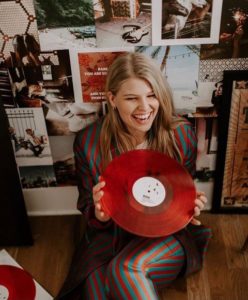Music industry recovering from COVID
Artists say they are experiencing the struggles and hardships that COVID-19 has brought to the music industry.
Just like many professions, the pandemic has taken its toll on those making their living in music. The year 2020 has been a challenge for the music industry, with work going from fully functioning and thriving to shut down and put on pause within weeks.
The music industry employs many people from around the world and can involve anyone, from singers and songwriters to producers and management teams among other jobs.
Before COVID-19, writing and recording music was a very hands-on and collaborative environment.
However, due to the virus and artists wanting to follow the restrictions and guidelines that have been put into place, the music process and how it happens has had to change.

Singer songwriter Brynn Elliott. (Photo by: Rachel Deeb)
“I have loved creating during this time,” said Brynn Elliott, a 25-year-old Atlanta based singer–songwriter. “At first, I was really scared of the Zoom sessions. I’m such an in-person person, and I’m still that way but, writing songs with people over a Zoom has been so fun and exciting. I think we were writing some of the best stuff we’ve ever written right now.”
The recording process has changed as well.
“I’ve done a bit of recording and it definitely is different because I’m doing it at a distance with my producer, or I’m doing it at home by myself which I’m not used to doing so it’s sort of like a whole new skill set that I have to learn,” said T. Thomason, a 26-year-old singer–songwriter from Nova Scotia.
One of the most obvious parts of the music industry affected during COVID-19 has been the ability to have live concerts and an in-person connection with fans. Although making music and releasing it is important to their career, most artists thrive off concerts and in–person meetings with fans to keep their career going in a positive direction.
“For me, my favorite part of performing is just being with people and fans and having that connection through music. I don’t think that will ever change for me. I think that’s all I wanna do,” said Elliott. “I think touring will be back. [We] obviously want to do it safely, but you know I’ll be on the road as soon as they say I can.”
Before the pandemic, concerts were an easy way for artists to meet their supporters and network. Since pandemic restrictions began last spring, concerts and fan meet ups have turned virtual and artists have mixed feelings about it.

Singer songwriter T. Thomason, Photo by Meghan Tansey Whitton
“There’s things that I really miss about the live shows. I miss having my band and the kind of emotional connection and the exhilaration and all of that stuff that happens when you got a group of people behind you on stage and you’re making a big sound together and there’s people responding,” said Thomason. “But there’s something nice about being in your own home setting it up feeling like you now have mastered the technology and learned a new skill and then pulled it off and you’re seeing people at home enjoying it.”
“I don’t think that I’d want to do it forever. It’s like a band aid solution, you know what I mean, but it’s not the worst.”
Many people in the music industry have been affected financially during COVID-19, having to find ways to make the industry safe before everyone could start working again. Even then, newer artists with smaller fan bases are struggling to stay financially stable. Newer artists are not able to sell or get as many streams on their work as the bigger artists were during these times.
“I think we’re really lucky that we had CERB. I would have been totally screwed if we didn’t have CERB,” said Thomason. “Then I got this TV show and so that again was really lucky, but if I was just trying to live only off of my music I would be like probably pretty screwed.” CERB, also known as the Canadian Emergency Response Benefit, was the financial support given to many Canadians during the spring and summer.
Some artists have had to get part-time jobs while others are sticking to their art and trying to stay positive during these times.
“I’ve been financially affected. I think for me I haven’t released music in a while so that will just inevitably affect me financially. For me at this beginning stage I really do need to get a lot of music out and so that revenue stream has been a little bit less. I’m not trying to make a bunch of money, but I think just like you’re right I’m just living independently. I think that’ll start to happen as I really see some next year and hopefully go on tour,” said Elliot.
For many artists and workers COVID might have affected their careers or plans for the future, but many have different views on if the pandemic has affected those plans.
“My future plans are still my future plans. I did have to delay some things. But I think that was a choice I made, and I think a lot artists made different choices based on a lot of variables like wherever they are. For me, I was just like okay I need to really think about this, but it’ll be good,” said Elliott. “The biggest thing is just hope. I think this year has been so hard, but I think it’s also shown us the importance of looking for the good in things in this world. And for me that’s gonna mean pushing forward and moving forward safely.”


